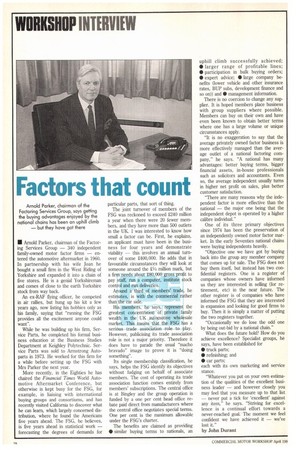Factors that count
Page 128

If you've noticed an error in this article please click here to report it so we can fix it.
Arnold Parker, chairman of the Factoring Services Group, says getting the buying advantages enjoyed by the national chains has been an uphill climb — but they have got there • Arnold Parker, chairman of the Factoring Services Group — 340 independent family-owned motor factor firms — entered the automotive aftermarket in 1960. In partnership with his wife Joan he bought a small firm in the West Riding of Yorkshire and expanded it into a chain of five stores. He is a genial Yorkshireman and comes of close to the earth Yorkshire stock from way back.
An ex-RAF flying officer, he competed in air rallies, but hung up his kit a few years ago, now listing his hobbies only as his family, saying that "running the FSG provides all the excitement anyone could want".
While he was building up his firm, Service Parts, he completed his formal business education at the Business Studies Department at Keighley Polytechnic. Service Parts was sold to Armstrong Autoparts in 1973. He worked for this firm for a while before setting up the FSG with Mrs Parker the next year.
More recently, in the Eighties he has chaired the Financial Times World Automotive Aftermarket Conference, but otherwise is kept busy for the FSG, for example, in liaising with international buying groups and consortiums, and has recently visited California to discover what he can learn, which largely concerned distribution, where he found the Americans five years ahead. The FSG, he believes, is five years ahead in statistical work — forecasting the degrees of demands for particular parts, that sort of thing.
The joint turnover of members of the FSG was reckoned to exceed 2240 million a year when there were 20 fewer members, and they have more than 500 outlets in the UK. I was interested to know how small a factor can be. First, he explains, an applicant must have been in the business for four years and demonstrate viability — this involves an annual turnover of some 2400,000. He adds that in favourable circumstances they will look at someone around the 21/4 million mark, but a firm needs about .280,000 gross profit to pay staff, run a computer, institute stock control and run deliveries.
Around a third of members' trade, he estimates, is with the commercial rather than the car side.
His members, he says, represent the greatest concentration of private family wealth in the UK automotive wholesale market. This means that the FSG has a serious trade association role to play. However, publicising its trade association role is not a major priority. Therefore it does have to parade the usual "macho bravado" image to prove it is "doing something".
Its single membership classification, he says, helps the FSG identify its objectives without fudging on behalf of associate members. The cost of operating its trade association function comes entirely from members' subscriptions. The central office is at Bingley and the group operation is funded by a one per cent head office rebate paid direct from manufacturers where the central office negotiates special terms. One per cent is the maximum allowable under the FSG's charter.
The benefits are claimed as providing • similar buying terms to nationals, an uphill climb successfully achieved; • larger range of profitable lines; • participation in bulk buying orders; • expert advice; • large company benefits (lower vehicle and other insurance rates, BUP subs, development finance and so on)) and • management information.
There is no coercion to change any supplier. It is hoped members place business with group suppliers where possible. Members can buy on their own and have even been known to obtain better terms where one has a large volume or unique circumstances apply.
"It is no exaggeration to say that the average privately owned factor business is more effectively managed than the average outlet of a national factoring company," he says. "A national has many advantages: better buying terms, bigger financial assets, in-house professionals such as solicitors and accountants. Even so, the average independent usually turns in higher net profit on sales, plus better customer satisfaction.
"There are many reasons why the independent factor is more effective than the national — the major one being that the independent depot is operated by a higher calibre individual."
One of its three primary objectives since 1974 has been the preservation of an independently owned motor factor market. In the early Seventies national chains were buying independents heavily.
"Objective one we have got by buying back into the group any member company that comes up for sale. The FSG does not buy them itself, but instead has two confidential registers. One is a register of companies whose owners have informed us they are interested in selling (for retirement, etc) in the near future. The other register is of companies who have informed the FSG that they are interested in expansion and looking for good firms to buy. Then it is simply a matter of putting the two registers together.
"Occasionally we do lose the odd one by being out-bid by a national chain."
What does the future hold? How do you achieve excellence? Specialist groups, 11 says, have been established for • truck parts; • refinishing; and • car parts; each with its own marketing and service stance.
"Whatever you put on your own estimation of the qualities of the excellent business leader — and however closely you may feel that you measure up to that list — never put a tick for 'excellent' against any item," he says. "Striving for excellence is a continual effort towards a never-reached goal: The moment we feel confident we have achieved it — we've lost it."
by John Durant








































































































































